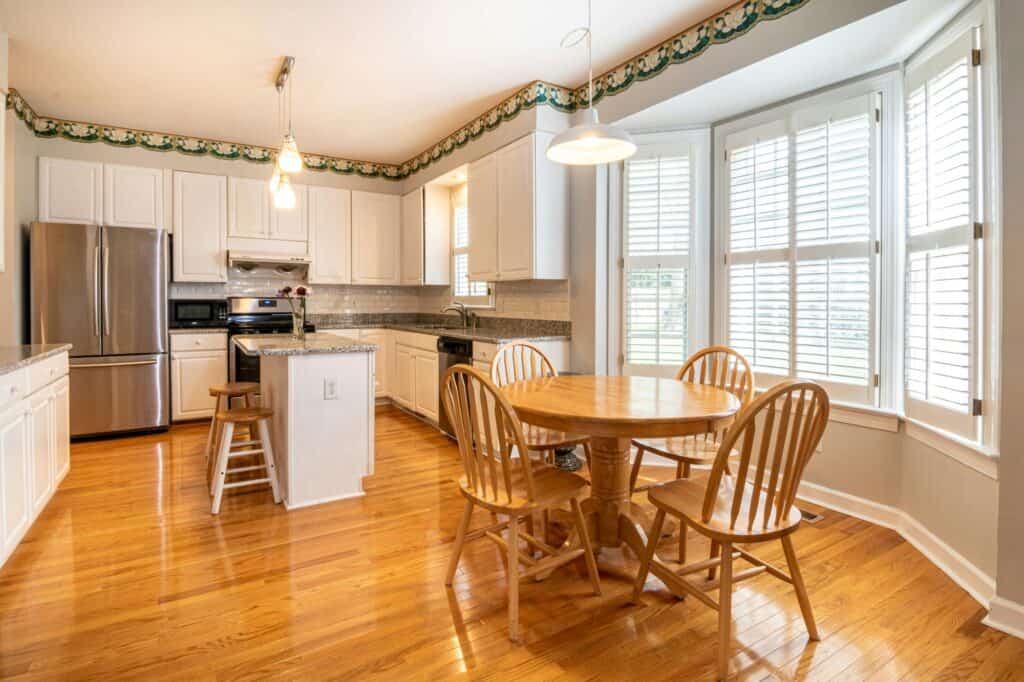Relocating to Woolwich doesn’t have to break the bank. Here’s how to save money when moving to Woolwich, from researching property prices and budgeting for your move to choosing the right moving company and taking advantage of government schemes. By following these tips, you can ensure a smooth and cost-effective transition to your new home, making the most of your resources and minimising unnecessary expenses along the way.
Key Takeaways
- Thorough research of property prices in Woolwich is essential to avoid overpaying and to find favourable deals during optimal moving periods.
- Creating a comprehensive budget that accounts for all moving expenses and utilising second-hand packing materials can significantly reduce costs during the relocation process.
- Taking advantage of government schemes and negotiating effectively with estate agents can provide financial benefits and ensure a successful property acquisition.
Research Property Prices in Woolwich
The first step in your relocation journey is understanding the property prices in Woolwich. Knowing the market helps ensure that you make a reasonable offer and avoid overpaying. In Woolwich Arsenal, the median price per square metre is £5,940, with half of the properties sold priced between £5,060 and £7,090 per square metre. This range provides a good benchmark for what you might expect to pay.
Comparatively, new builds on Woolwich High Street have an average price of £7,083 per square metre. For a typical 67 sqm property in Woolwich Arsenal, you might be looking at an average price of around £490,686. These figures highlight the premium attached to newer developments, but also the variation within different parts of Woolwich.
Monitoring property listings during quieter months can also reveal more favourable prices due to less competition. Late summer or early fall, for example, can be optimal times to find good deals as many families prefer to move before the new school year begins. Monitoring market trends positions you to make a smart and financially prudent purchase.
Budgeting for Your Move
A comprehensive budget helps manage all expected moving expenses. This includes costs such as packing materials, transportation, legal fees, and more. Meticulous planning helps avoid unexpected financial surprises and ensures a smoother transition to your new home.
One effective way to save money is by using second-hand or free packing materials. While this can be a cost-effective option, investing in sturdy boxes can ensure the safer transport of your belongings. Additionally, planning meals ahead during the moving process helps you avoid the temptation of expensive takeout, contributing to overall cost savings.
Legal fees for conveyancing can also add up quickly. However, you can minimise these costs by using the same solicitor for both buying and selling your property. This not only simplifies the process but can also result in significant savings. Moreover, it’s wise to allocate funds for potential delays or unexpected expenses that may arise during the journey.
Lastly, having a well-thought-out budget allows you to better manage your monthly payments post-move. Tracking all expenses ensures that everything from the deposit to the final bill payments is accounted for. This strategic approach will not only help you save money but also reduce stress during your move to Woolwich.
Choosing the Right Moving Company
Choosing the right moving company can make a significant difference in both the cost and ease of your move. Start by obtaining quotes from at least three to five companies. This allows for effective comparison and better negotiation, potentially leading to substantial cost savings.
Customer reviews on platforms such as ConsumerAffairs and social media can provide valuable insights into a moving company’s reputation. Reading about other customers’ experiences can help you make an informed decision. Additionally, moving during off-peak seasons, such as winter, can often result in lower costs due to decreased demand.
If your schedule allows, consider moving during weekdays, particularly mid-week. This can lead to better availability and potentially lower prices from moving companies. Strategic planning and selecting the right moving company to ensure a smoother, cost-effective relocation.
Packing Efficiently to Save Money
Packing efficiently is a crucial part of saving money during your move. Start by decluttering your home. Not only does this reduce the number of items you need to transport, but it also presents an opportunity to sell unwanted belongings for extra cash. This step alone can significantly lower your moving costs.

Using recyclable packing materials, such as cardboard boxes and paper-based tape, can further cut costs and reduce waste. Free or recycled boxes are also great options that can save you money while being environmentally friendly. For a more durable solution, consider reusable moving boxes which are both sturdy and eco-friendly.
Organising your items by room and labelling boxes with their contents and destination room can streamline the packing process and make unpacking much easier. This level of organisation not only saves time but also minimises the risk of items getting lost or damaged during the move. Efficient packing is an essential step to ensure a cost-effective and smooth transition to your new home.
Timing Your Move
Timing your move can have a significant impact on your overall costs and the deals you find on properties. The best time to find good property deals in Woolwich is typically during the late summer or early fall, as many families prefer to move before the new school year begins. This period often sees more properties on the market, providing you with better choices and negotiating power.
January is also considered a favourable month to move. Many landlords reduce rents or offer incentives to fill vacancies during the post-holiday period, which can result in significant savings.
Planning your move around these times can lead to lower costs and better property opportunities, especially if you are aware of the completion date. Awareness of optimal moving times and proper planning maximise your relocation budget.
Timing is everything, and with careful planning, you can ensure that your move is both cost-effective and strategically sound.
Take Advantage of Government Schemes
Government schemes can provide substantial financial assistance when moving to Woolwich. The Help-to-Buy scheme, for instance, includes an equity loan scheme that assists with deposits and a mortgage guarantee scheme that lowers borrowing costs. These options can make buying a home more affordable.
In Woolwich, shared ownership initiatives allow buyers to purchase between 25% and 75% of a property and pay a reduced rent on the remainder. This scheme is particularly beneficial for those who may not have the means to buy a property outright. To qualify for shared ownership in Royal Greenwich, household income must be below £90,000, with stricter local income limits for specific property sizes.
… government initiatives are designed to make homeownership and renting more accessible and affordable, helping you save money and invest wisely in your new home.
Another valuable resource is Meridian Home Start, which provides discounted rental options for local families facing challenges in the housing market. These government initiatives are designed to make homeownership and renting more accessible and affordable, helping you save money and invest wisely in your new home.
Managing Monthly Payments Post-Move
Managing your monthly payments effectively post-move is crucial for maintaining financial stability. Creating a detailed budget helps in tracking all monthly expenses, ensuring that all payments are managed efficiently. Regularly reviewing your budget allows for adjustments based on income changes or unexpected expenses.
Consider using budgeting apps to help track expenses and manage monthly payments. These tools can provide insights into your spending patterns and help you stay on top of your financial commitments. Setting up automatic payments for recurring bills can prevent missed payments and help maintain a good credit score.
Prioritising higher-interest debts can also reduce your overall financial burden in the long run. Staying organized and proactive with finances ensures a smooth transition into your new home without unnecessary financial stress.

Exploring Affordable Local Services
Woolwich offers a range of affordable local services that can help you save money. Budget-friendly grocery stores like Lidl and Aldi are known for their low prices on essential items, making it easier to manage your household expenses. These stores offer quality products at competitive prices, helping you afford the cost of living in Woolwich.
Public transportation in Woolwich is both accessible and cost-effective. Buses provide a budget-friendly way to navigate the area and are well-connected to other parts of London. The Docklands Light Railway (DLR) is another economical option for residents, offering reliable and affordable transport. With these options, getting around the city doesn’t have to break the bank.
Community resources in Woolwich, such as local food banks and support services, are also available to assist residents in need. These services can provide additional support and help you manage your finances more effectively. Exploring and utilising these affordable local services can significantly ease your financial load after moving to Woolwich.
Negotiating with Estate Agents
Negotiating with estate agents is crucial for securing better deals on property prices and related services. One effective strategy is to downplay your budget when contacting estate agents, as this can strengthen your negotiation position. Emphasising your financial readiness, such as having a mortgage lender agreement, can make you more appealing to sellers.
If a seller has been trying to sell a property for a long time, they may be more open to accepting lower offers. Additionally, a holding deposit can demonstrate your seriousness in making an offer, but it’s important to clearly understand the terms.
Buyers should also request that the property be taken off the market once their offer is accepted to secure their potential purchase. Effective negotiation helps secure the best possible deal on your new home. This not only saves you money but also helps you secure a property that meets your needs and budget.
Understanding Additional Costs
Understanding the additional costs involved in buying a property in Woolwich is essential for effective financial planning. Stamp duty, for example, is charged on residential property transactions exceeding £250,000. The current stamp duty rates are structured progressively, starting from 0% for the first £250,000.
First-time buyers in Woolwich can avoid stamp duty on properties up to £425,000, which can result in significant savings. However, purchasing an additional property incurs a 3% surcharge on top of the standard stamp duty rates. It’s essential to pay stamp duty within 30 days of the property transaction completion to avoid penalties.
Besides stamp duty, aspiring homeowners should also be aware of legal fees and survey costs involved in property transactions. Minimising costs involves researching and negotiating legal fees and timing transactions to benefit from lower costs. By understanding and planning for these additional costs, you can ensure a smoother and more financially sound purchasing process.
Summary
In summary, moving to Woolwich can be a financially savvy decision if you take the right steps. Researching property prices, creating a comprehensive budget, choosing the right moving company, and packing efficiently can significantly reduce your moving expenses. Timing your move strategically, taking advantage of government schemes, managing your monthly payments effectively, exploring affordable local services, and negotiating with estate agents can help secure the best deals. Understanding additional costs such as stamp duty and legal fees will help you plan your finances more effectively. Applying these tips and tricks will not only save you money but also make your move to Woolwich a smoother and more enjoyable experience.
Frequently Asked Questions
What are the average property prices in Woolwich?
The average property price in Woolwich Arsenal is £5,940 per square metre, with a range of £5,060 to £7,090 per square metre. This pricing reflects the local real estate market dynamics.
How can I save money on packing materials?
To save money on packing materials, utilise second-hand or free options while ensuring you invest in sturdy boxes for safer transport.
When is the best time to move to Woolwich?
The best time to move to Woolwich is during late summer or early fall for favourable property deals, while January may provide lower rent options and incentives.
Are there government schemes to help me buy a home in Woolwich?
Yes, the Help to Buy scheme and shared ownership initiatives are available to assist with deposits and reduce borrowing costs for homebuyers in Woolwich.
What additional costs should I be aware of when buying a property in Woolwich?
When buying a property in Woolwich, be aware of additional costs such as stamp duty, legal fees, and survey costs. These expenses can significantly affect your overall budget.







